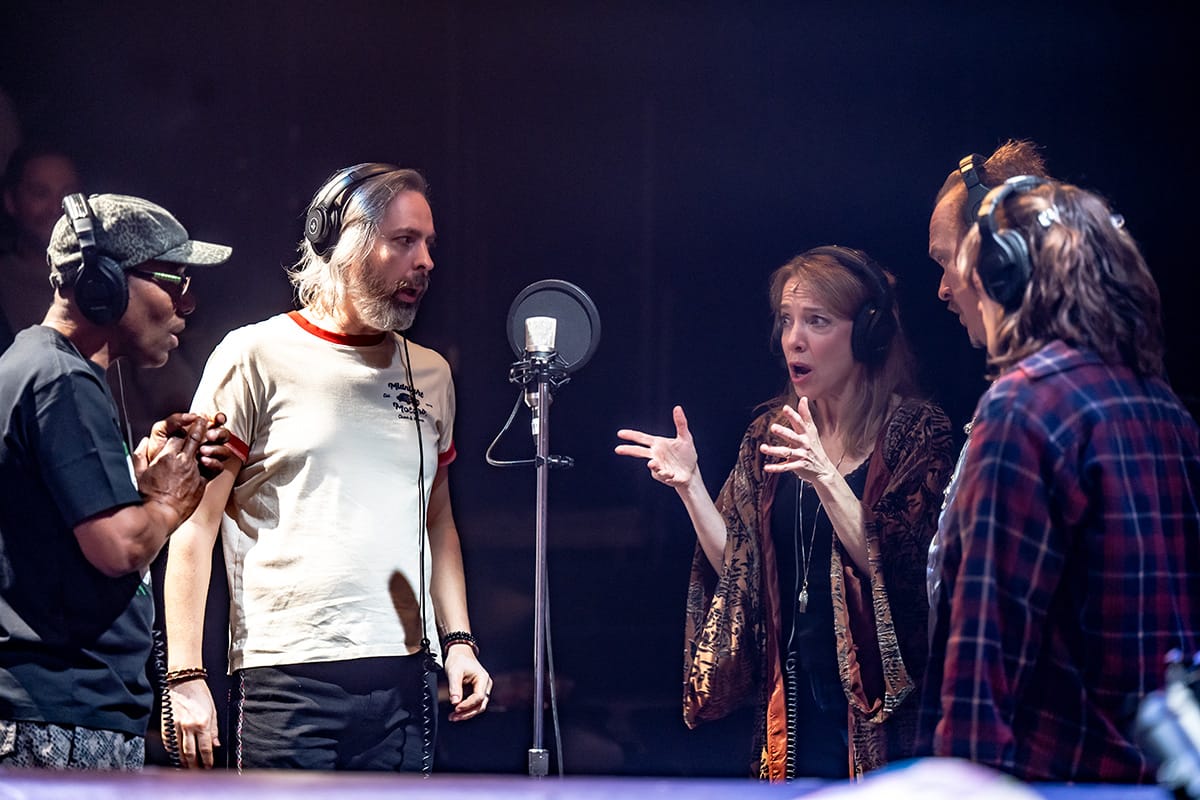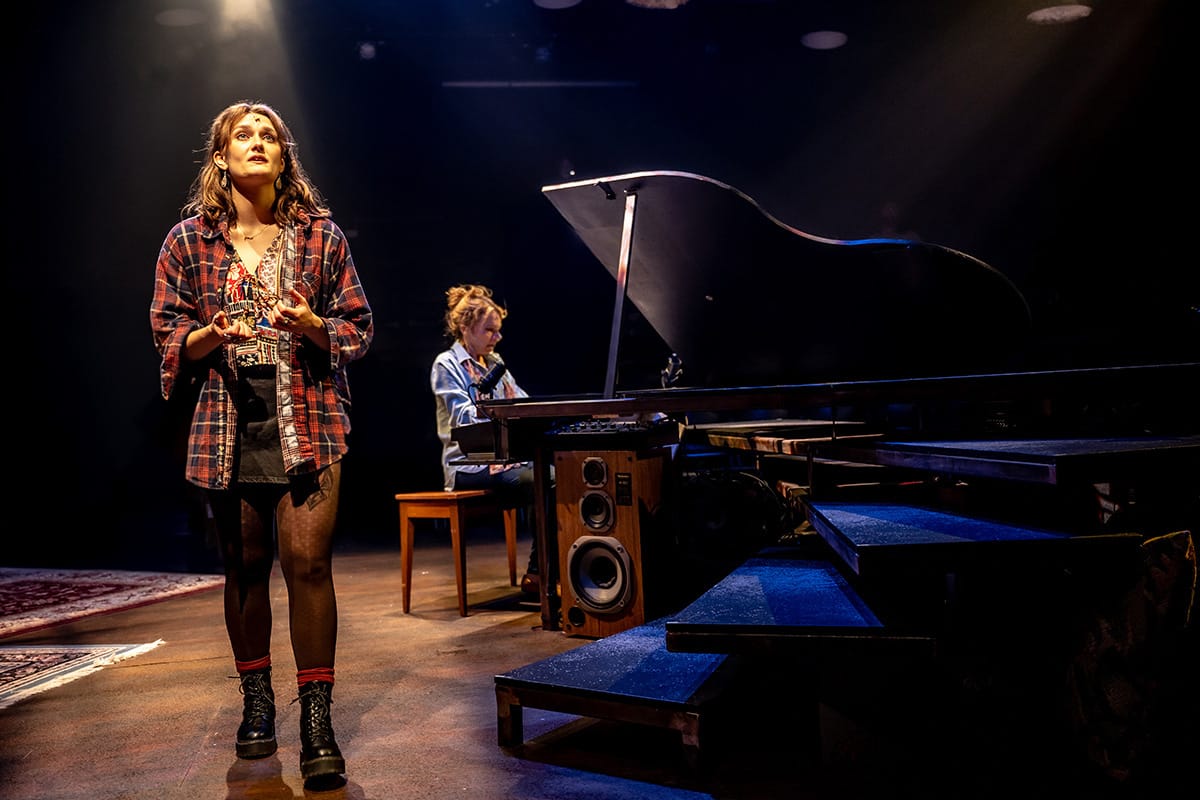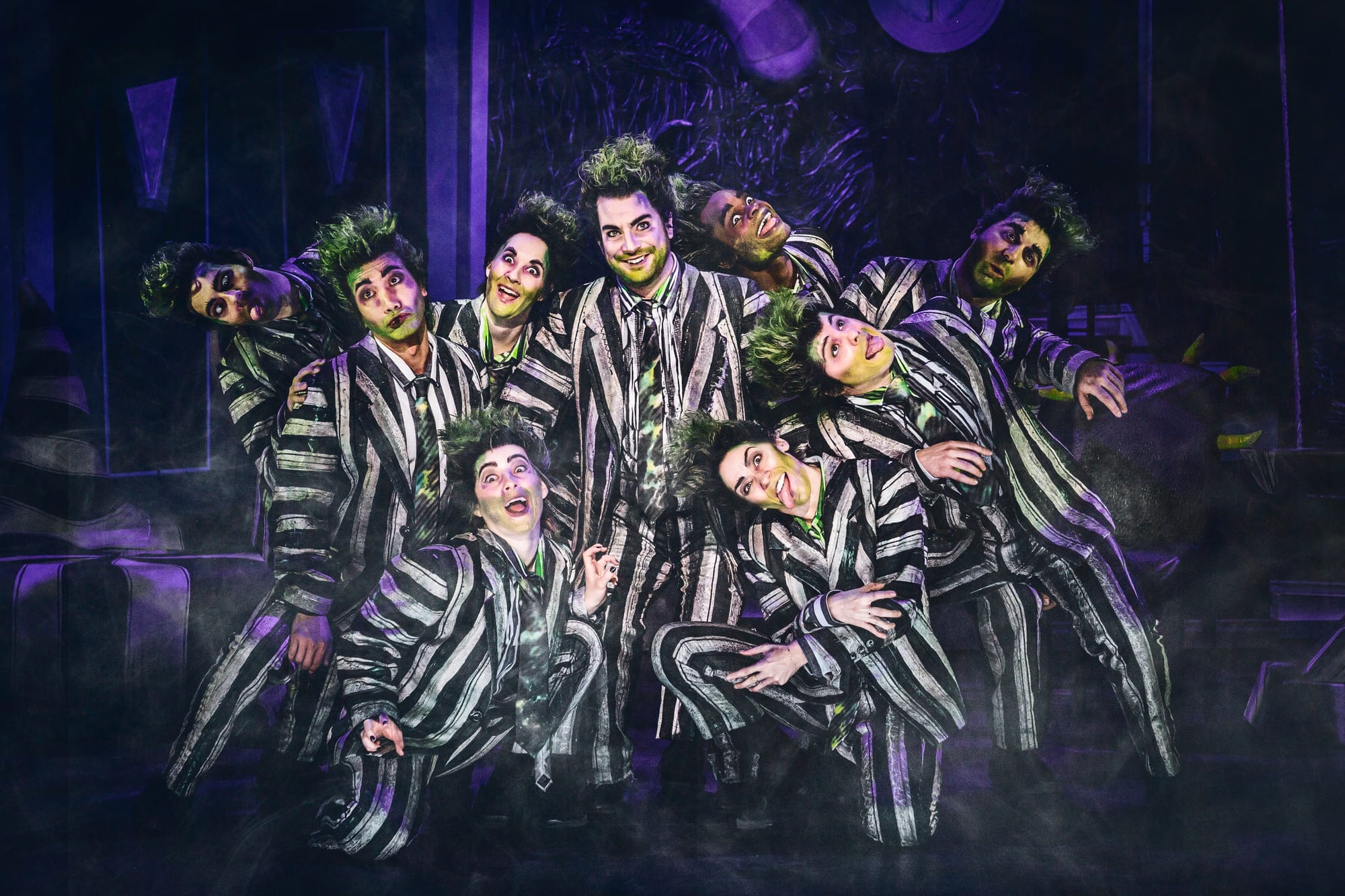Musicals reviews: After the Rain, Beetlejuice, and a new era for Musical Stage Co.
Suzy Wilde proves she's wildly talented, while Beetlejuice scares up some big laughs and Michael Rubinoff takes the reins at Canada's largest not-for-profit musical theatre company

It’s about time that Suzy Wilde got her flowers. Over the years, she’s co-written many terrific indie musicals, including Be Kind Rewind, Summerland and Maddie’s Karaoke Birthday, most of them part of summer festivals and all of them written with other composers or lyricists.
After the Rain (Rating: ✭✭✭), for which she wrote all the songs and lyrics herself, is a co-production between the Tarragon Theatre and The Musical Stage Company, and is arguably her highest profile show yet. It also feels like her most personal, perhaps because its main character has a first name — and a family background — that sounds a lot like hers.
Suzie (Annika Tupper) is a young woman who’s grown up with two musical parents, Jean Stone (Deborah Hay) and Ashley Evans (Andrew Penner), who are the lead singers in a well-known folk rock band. (Wilde grew up in a very musical household herself: her parents are musicians Nancy White and Doug Wilde, while her sister is indie rock musician Maddy Wilde.)
Not formally trained as a musician, Suzie works on arrangements and sound checks for the band, which also includes drummer JD Kunkel (Joe “Jojo” Bowden) and bassist Mickey Mintz (Brandon McGibbon). But she isn’t officially a part of the group. She’s rather directionless, actually, symbolized by her relationship with a hot but dumb aspiring musician boyfriend (played by a volunteer audience member; more on this later).
When Ashley, who helps pay the bills by giving private lessons, passes off a new student to her, Suzie begins instructing a middle-aged woman named Donna (also played by Hay), who only wants to learn one song — Erik Satie’s deceptively simple-sounding Gymnopédie No. 1.
Donna takes a big interest in Suzie’s life, encouraging her to study music at university. That contrasts with Suzie’s own self-involved mother, who’s more concerned with cutting a new record and launching a comeback tour than with what her daughter’s doing with her life.
As with Once and Stereophonic, the music in After the Rain is mostly diegetic — it exists in the world of the play as songs that are sung in rehearsal, during recording sessions, in live performances, etc. In a haunting motif, Suzie finds herself humming wisps of a melody to herself throughout the show — a nice suggestion of how the creative process works, but also a metaphor for our lead character attempting to find her own, singular voice amidst so many competing ones.
While the catchy, beautifully arranged and performed songs work on their own (at intermission I overheard several people wondering if there was a cast album) and give us a real sense of the textures and dramas in these characters’ lives, Rose Napoli’s book is less helpful.
It takes a long time to figure out what the show is even about. Partly that’s due to Suzie’s initial passivity, but it’s also because we know so little about any of the people in the show that it’s hard to feel for what they’re going through.

Penner, whom we’ll see next month in the Mirvish extension of Natasha, Pierre & the Great Comet of 1812 at the Royal Alex, gets a couple of terrific moments at the mic — he also has a cute scene teaching a bunch of “ukebabies.”
(These babies are chosen from the audience, who sit on either side of David Boechler’s raised platform set in the middle. I’m not sure why Wilde, Napoli and director Marie Farsi decided to rely on so much audience participation, but it adds to the play’s overlong run time, and doesn’t add much to the experience.)
Tupper exudes a warmth and spontaneity, and possesses a clear singing voice; more importantly, she has the authority to anchor a show in which she’s essentially acting as narrator to this important chapter in her character’s life.
We don’t really get to know drummer Bowden or bassist Mintz, which is a shame; I believe Mickey is Suzie’s godfather, and even a quick exchange between the two (or Jean and Ashley) could have filled in some blanks in their vague back stories. Also, McGibbon is a fine actor in his own right; when you have an actor with his skills and experience, you should use him more.
Thankfully, Hay brings her two contrasting characters — one a mother, one a mother substitute — to vivid life. Her Jean is ambitious, jaded, and self-obsessed, but she’s had to survive things in her own life that have made her that way. Donna, on the other hand, has enjoyed privileges the other family hasn’t had, but she’s more sensitive to the needs of those around her, including her soft-spoken husband Frank (Penner) and possibly neurodiverse son Julian (Shaemus Swets).
Ming Wong’s costume designs for both her characters — flowing shawls or robe dresses, tailored solid-coloured dresses — help set them apart.
But the real star of the show is Wilde. Just like her lead character begins to find her voice, I’m excited to see where her creative path takes her next.
After the Rain continues at the Tarragon Mainspace (30 Bridgman), until June 22. See info or buy tickets here.
While on the subject of Musical Stage Company, the largest not-for-profit musical theatre company in the country just announced its new artistic director earlier this week: Michael Rubinoff, the Olivier Award-winning and Tony Award-nominated originating producer of Come From Away.
Rubinoff founded the Canadian Theatre Musical Project at Sheridan College, which helped develop new musicals like Come From Away, The Theory of Relativity, Maggie and Grow.
“I’m honoured to join the company at this pivotal moment of reflection on cultural sovereignty, when the urgency to champion Canadian stories and artists has never been greater,” said Rubinoff in a statement.
“I’ve seen the global resonance of our musicals — proof that the world is eager for our diverse voices and perspectives. I look forward to working with the incredible team to expand new musical development, build international partnerships, and reimagine existing works through a distinct Canadian lens.”
He will continue to develop his own commercial works outside of Musical Stage, which was founded as Acting Up Stage Company in 2004 by Mitchell Marcus.
“I’m very fortunate that the board and I have an arrangement where I will be able to continue on the commercial projects I have already at different stages of development,” Rubinoff told the Globe and Mail’s Aisling Murphy.
One such project is the buzzed-about show It’s a Good Life If You Don’t Weaken, featuring songs by the iconic Canadian band The Tragically Hip. The show, with a book by Brian Hill and Ahmed Moneka, is set to premiere next year at Theatre Aquarius in Hamilton, the same place where an early version of Maggie premiered a couple of years ago.
“I’m hoping this role will allow me to expand the things I’m passionate about, particularly international collaborations,” Rubinoff, who begins his job at Musical Stage at the end of the month, told the Globe.
“I want to ramp up the amount of development we can do with various writers. And I want to re-examine the projects that the company produces from the existing canon, and look at how we can see those shows through an even more distinctly Canadian lens.”

Dead rock-ening
If you’re a fan of musical comedies, I hope you check out Beetlejuice, which is running at the CAA Ed Mirvish Theatre until July 19 — a way longer run than most other cities got for this national tour.
The multiple Tony Award-nominee was one of the last Broadway productions I saw before the pandemic hit (it’s returning there this fall). This tour captures most of the same spirit of that original except for the usual concessions: a more modest (if still incredibly fun) set, some shifting around of the roles (the characters of Delia and Miss Argentina were played by the same fabulous actor, Leslie Kritzer; now they’re performed, very well, by separate actors).
Here’s my Toronto Star review of the show, and here’s my colleague Joshua Chong’s interview with its New Brunswick-born star Justin Collette, who lived in Toronto for a while and was a big part of the indie comedy scene.

If you like a different kind of stage magic, I reviewed David Kwong’s The Enigmatist — a mix of puzzle solving and magic — here. The all-ages show is only playing for another week.
And now that the summer theatre season is upon us, here is a piece I wrote a couple of weeks ago about 10 shows to see within a couple hours of the GTA. Speaking of which, I’m hoping to get to a few of those — and others — soon. I’ll be sure to post about them here.
Also coming up:
• An interview with Video on Trial (remember those days?), Bitch Salad, Laugh Sabbath and frequent JFL stand-up comic Andrew Johnston, who’s headlining the Gay AF Pride-a-Palooza show at Buddies in Bad Times next Friday (June 20). See details here.
• Reviews of two Luminato shows.
• A list of 10 artists to watch at the 2025 Toronto Fringe, which will be shifting most of the action from the Annex down to the Distillery District and surrounding areas this year. After pouring over the website and program, I can’t wait to see dozens of these shows. I’m also curious to find out the difference between the Young Centre’s RBC Studio and TD Studios. At least corporations are sponsoring the arts, I guess?
